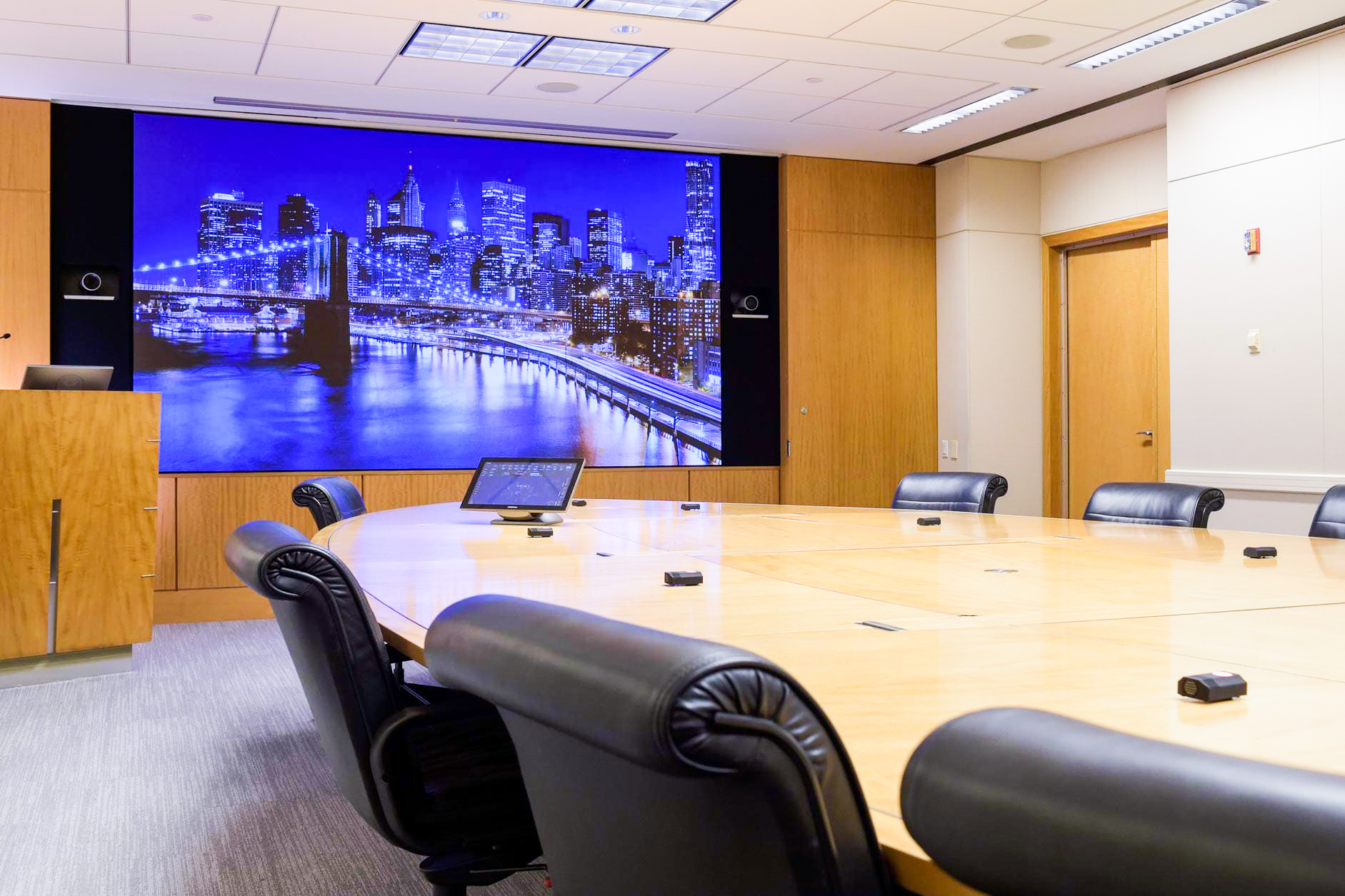Here To Help Protect
Restaurants
Thompson Electronics Company provides Illinois restaurants, cafes, hotels, and the hospitality industry with custom-engineered solutions for audiovisual, security, mass communication, and fire alarm systems.
How We Protect Restaurants
Thompson Electronics Company has a team of professionals to ensure your projects are handled with care. We provide our clients with exactly what they need and work with companies of all sizes.
Audiovisual
We provide audiovisual systems that are integrated with your business in mind. Each client’s unique needs are considered for every project while providing a volunteer-friendly, reliable solution.
Security
Our security systems consist of access control, video surveillance, intrusion detection, and monitoring. These systems help protect people, assests, and property 24/7.
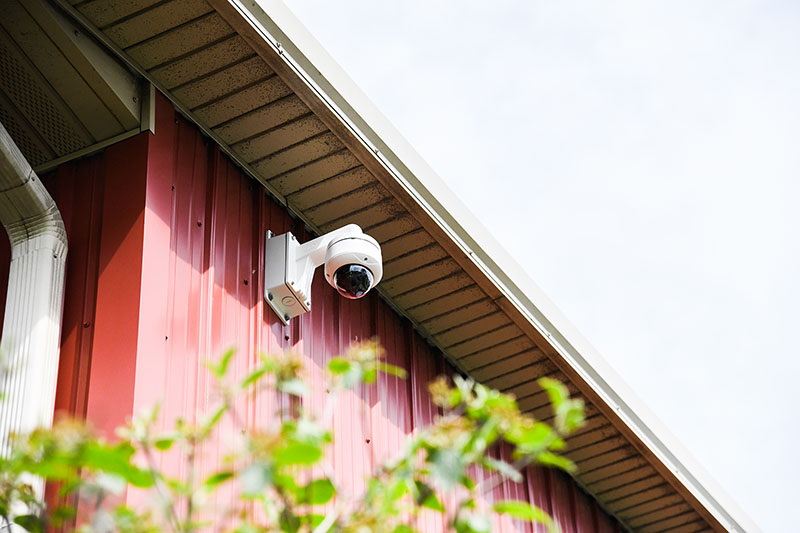
Fire Alarm
We design and install fire alarm systems to keep all occupants safe during an emergency. We also administer fire alarm inspections that are up to NFPA standards. Inspections are scheduled in advance and always completed on time.
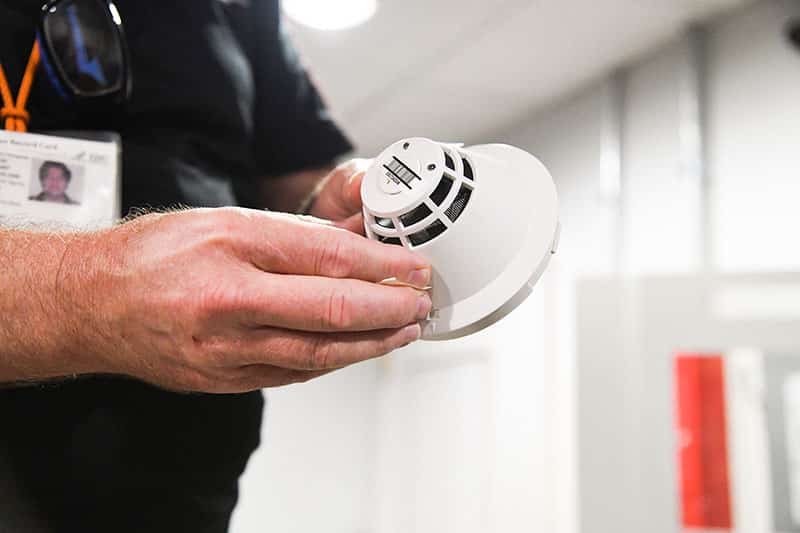
Mass Communication
We offer mass communication systems, like synchronized clocks, speakers, and PA systems, and mass notification systems, to alert the proper authorities in an emergency or if there’s potential danger.
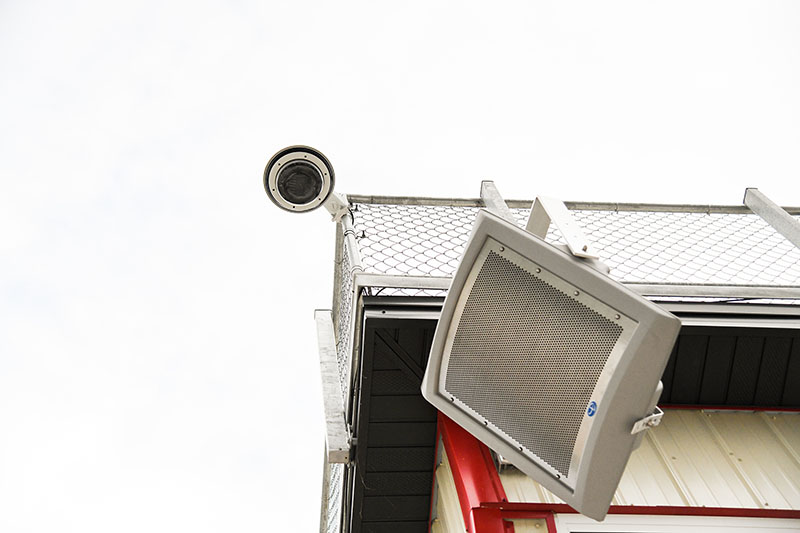
Audiovisual Solutions
AV solutions are integral in enhancing the ambiance, improving operational efficiency, and creating a more engaging, comfortable environment for customers and staff in the restaurant and hospitality industries. They help businesses differentiate themselves, improve customer satisfaction, and streamline internal processes.
Enhancing Guest Experience
- Ambience and Atmosphere: AV solutions like background music, lighting control, and video projections help create a welcoming, enjoyable atmosphere. This can influence guests’ mood and overall satisfaction, making them more likely to return.
- Entertainment and Engagement: Restaurants and hotels often use AV systems for entertainment, such as live sports broadcasts, music videos, or interactive displays. This can attract customers who want a more engaging dining or stay experience.
- Personalized Experiences: For events like private parties, weddings, or corporate meetings, AV solutions can be tailored to fit specific themes or preferences, creating memorable experiences for guests.
Improved Communication
- Menu Display and Digital Signage: AV tools like digital menus or signage can showcase daily specials, promotions, and important information, offering customers an intuitive and dynamic way to stay informed.
- Real-time Communication: AV systems, including intercoms or PA systems, are crucial for communication between staff, especially in large venues, helping coordinate operations more effectively.
- Multi-Language Support: Digital displays or interactive systems can support multiple languages, making international guests feel more comfortable and catered to.
Support for Events and Conferences
- Seamless Event Management: For venues hosting conferences, meetings, or large events, AV solutions like projectors, microphones, and video conferencing tools are essential for delivering clear, professional presentations and ensuring smooth communication.
- Hybrid and Virtual Events: The ability to stream events or meetings online via AV technology allows hospitality businesses to attract a wider audience, including those attending virtually.
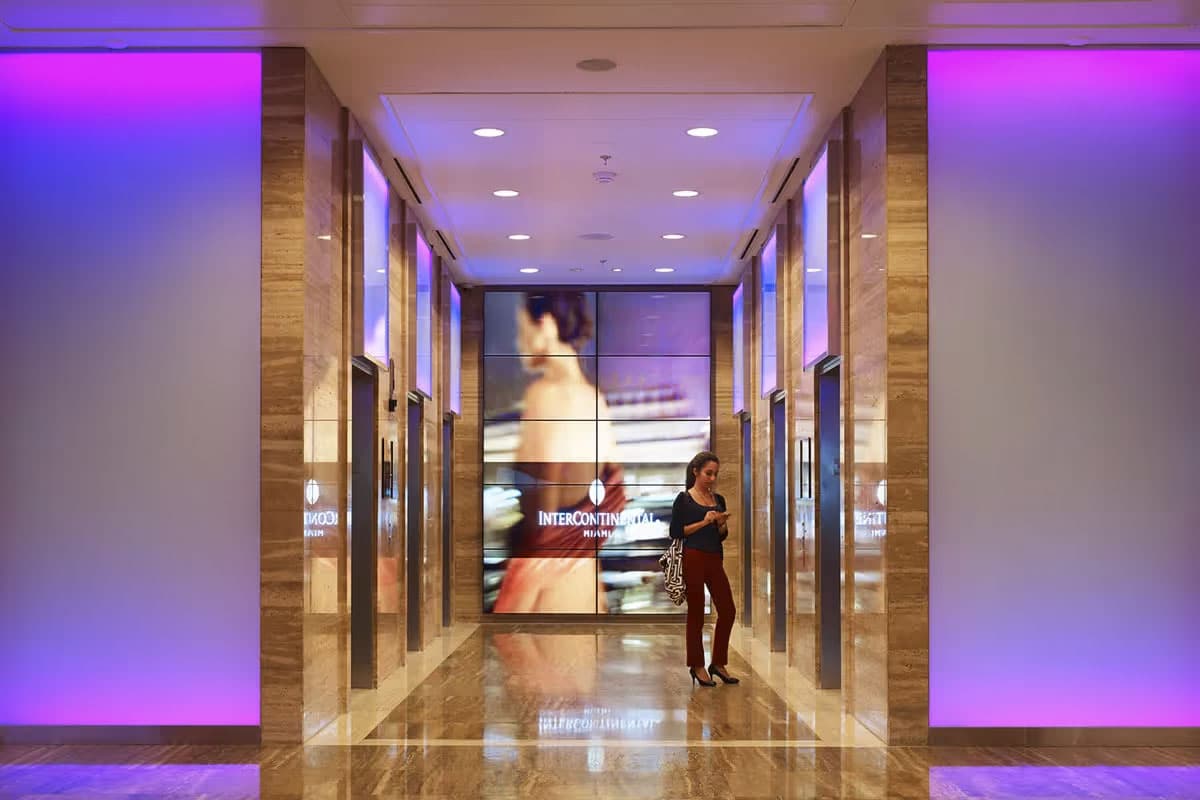
Brand Identity and Marketing
- Brand Consistency: AV solutions can be used to showcase a brand’s logo, colors, and messaging through digital signage or video content. This strengthens brand identity and creates a unified, polished experience for guests.
- Promotions and Upselling: In restaurants or hotels, digital displays and screens can be used for dynamic advertising. Upselling desserts, drinks, or event bookings through targeted AV messaging can increase revenue.
Operational Efficiency
- Ease of Management: With integrated AV systems, restaurants and hotels can control various elements like lighting, audio, and video from a centralized system, streamlining operations and saving time. This is particularly useful for large venues with multiple rooms or sections.
- Training and Staff Communication: AV systems can be used to train staff, display operational procedures, or communicate important updates. It also helps staff stay aligned with clear, visible instructions during busy shifts.
- Energy Efficiency: Smart AV systems can automate lighting and audio, turning them off when not needed, helping businesses save energy and reduce costs.
Safety and Security
- Surveillance Systems: AV systems that include security cameras and alarms are crucial for maintaining the safety of guests and staff. These systems help monitor areas in real-time and prevent incidents.
- Emergency Notifications: In case of emergencies, AV systems can broadcast alerts or instructions across the venue, ensuring guests are informed and safe.
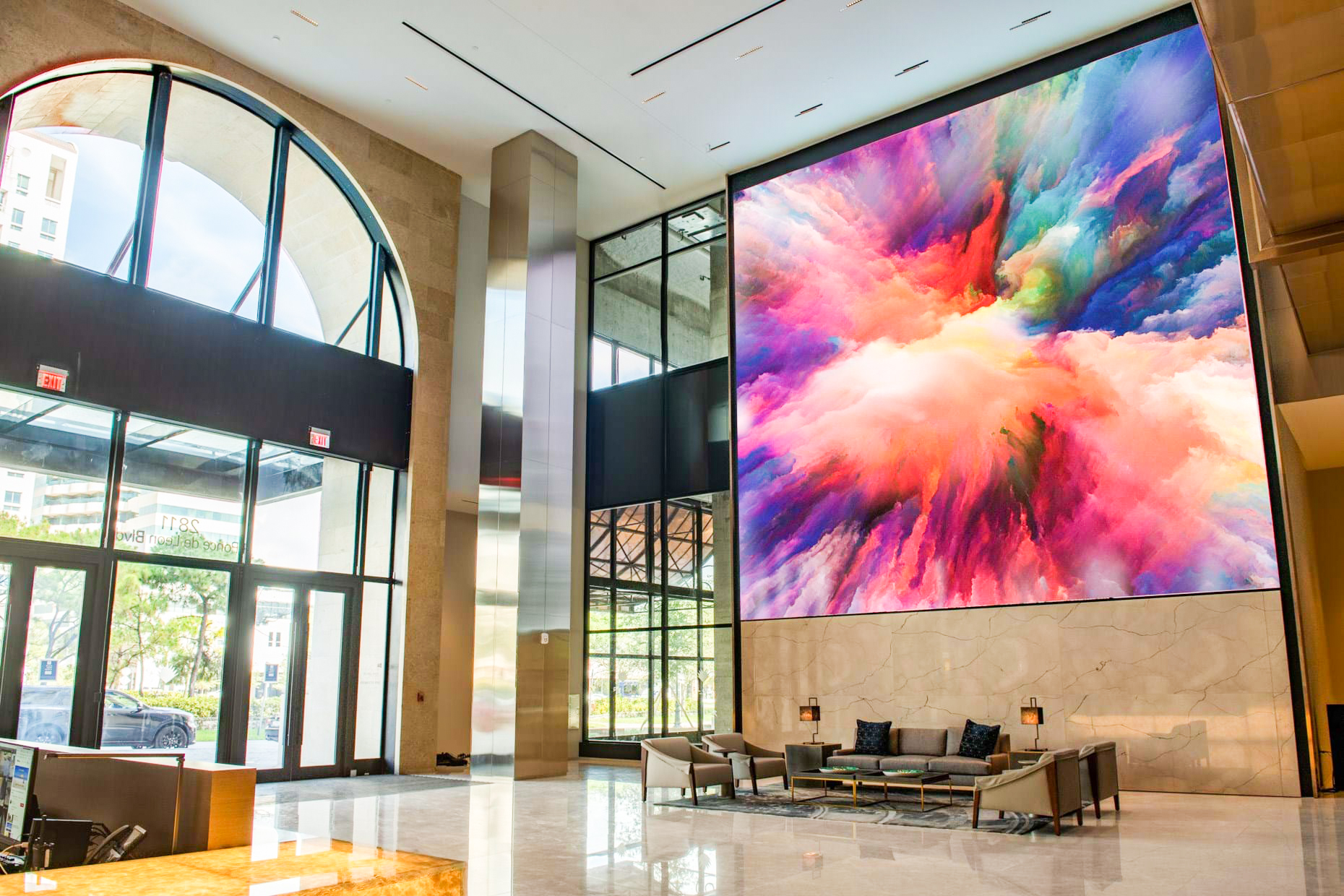
Security Systems
A security system in the restaurant and hospitality industry is essential for protecting guests, employees, and property. It plays a vital role in preventing theft, ensuring safety, safeguarding customer data, and maintaining operational integrity. Ultimately, a strong security system enhances the reputation of the business and creates a safe and secure environment for everyone involved.
Protecting Guests and Staff
- Physical Safety: A robust security system, including surveillance cameras, alarms, and access control systems, helps protect guests and employees from potential threats, such as theft, violence, or accidents. Having visible security measures can also deter criminal activity.
- Emergency Response: In case of an emergency (fire, medical, or security threats), a security system allows quick communication and coordination with first responders, ensuring the safety of everyone on the premises.
Theft and Loss Prevention
- Monitoring for Theft: Security cameras and sensors help monitor areas prone to theft, such as kitchens, bars, storage rooms, and cash registers. Both employees and customers are less likely to engage in theft if they know the area is being monitored.
- Protecting Inventory: Restaurants and hotels are often targets for theft of food, beverages, or expensive equipment. A security system can prevent loss by keeping sensitive areas under surveillance and using access control to limit unauthorized entry.
Data Security
- Protecting Customer Information: In the digital age, hospitality businesses store sensitive customer data such as payment information, booking details, and personal preferences. A security system that includes cybersecurity measures is essential to protect this data from hackers and cybercriminals.
- Compliance with Regulations: Restaurants and hotels must comply with regulations regarding customer data security (e.g., PCI DSS for payment card information). A security system ensures compliance and helps avoid costly fines or damage to reputation due to data breaches.
Protecting Property and Assets
- Equipment Security: Hospitality businesses invest heavily in expensive equipment like kitchen appliances, AV systems, and furniture. A security system helps ensure that these assets are protected from damage or theft.
- Preventing Vandalism: Restaurants and hotels are often located in high-traffic areas, which can expose them to the risk of vandalism. Security systems like surveillance cameras and alarms can help deter such activities and provide evidence if incidents occur.
Operational Efficiency and Monitoring
- Staff Monitoring: A security system helps managers and owners ensure that staff members follow proper procedures, especially when it comes to handling cash, serving alcohol, or maintaining safety standards in the kitchen. It provides oversight and can highlight areas for improvement.
- Monitoring High-Risk Areas: Some areas, like cash registers or kitchens, are more vulnerable to incidents. Security cameras and monitoring systems can be focused on these high-risk zones, offering better control over the premises.
Customer Trust and Satisfaction
- Building Trust: Customers are more likely to feel safe and secure when they see visible security measures in place. This boosts their confidence in your business, enhancing their overall experience and encouraging repeat visits.
- Reducing Liability: A comprehensive security system helps mitigate risks that could result in accidents or liabilities. For example, cameras can provide evidence in case of disputes, reducing the likelihood of legal issues arising from false claims.
Managing Access Control
- Controlled Entry: A security system allows businesses to control who enters certain areas, such as staff-only zones, storage rooms, or guest rooms in hotels. This helps ensure that only authorized personnel access sensitive areas, reducing the risk of theft or accidents.
- Monitoring Access Points: Restaurants and hotels often have multiple entry and exit points. A security system with integrated access control can help monitor and manage traffic flow, ensuring that unauthorized people do not enter restricted areas.
24/7 Monitoring
- Continuous Protection: Many security systems in the hospitality industry are set up for round-the-clock monitoring, ensuring that the premises are protected at all times, whether it’s during business hours or after hours when the business is closed.
- Remote Monitoring: Modern security systems can be monitored remotely, allowing owners and managers to keep an eye on their property and staff even when they’re not physically on-site.
Deterring Crime and Liability
- Deterrence: Visible security systems act as a deterrent to criminal activity, such as theft, vandalism, or violent incidents. Potential wrongdoers are less likely to target a location if they know it is actively being monitored.
- Insurance and Liability: A comprehensive security system can also lower insurance premiums. Additionally, if an incident occurs, having a security system in place can reduce liability by providing evidence to support your case.
Responding to Threats
- Real-Time Alerts: Advanced security systems provide real-time alerts and notifications to management or security personnel in case of any unusual activity or breaches. This ensures a quick response to potential threats, minimizing damage and enhancing safety.
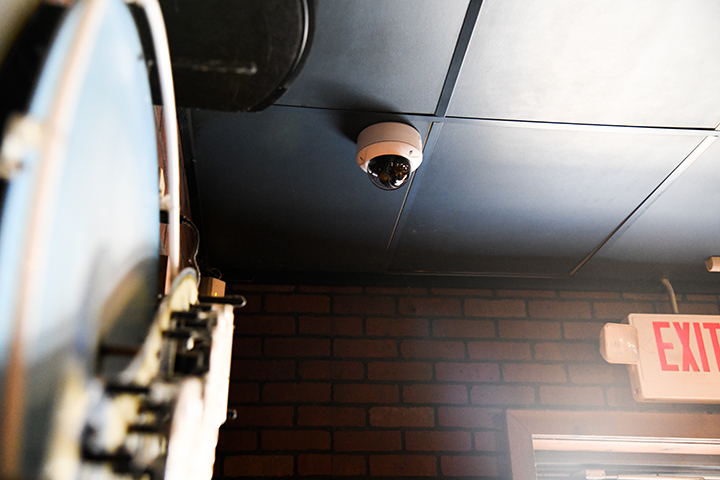
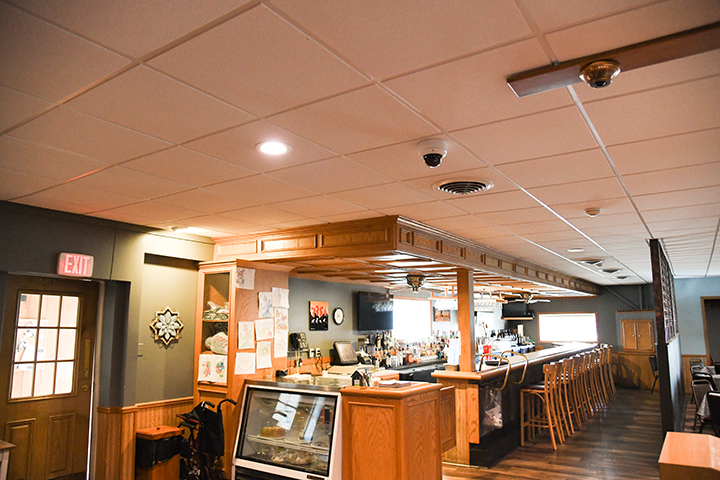
Fire Alarm Systems
Having a fire alarm system in a restaurant or hotel is crucial for several reasons, primarily for the safety of guests, staff, and the property itself.
Life Safety
- Early Detection: A fire alarm system helps detect fires in their early stages, giving people enough time to evacuate safely. This is especially important in a restaurant or hotel, where large numbers of people may be inside, and panic can make evacuations more difficult.
- Audible and Visual Alerts: Fire alarms alert occupants through both sound and flashing lights, ensuring that everyone, including those with hearing impairments or in noisy environments, is notified.
Compliance with Legal Requirements
- Building Codes and Regulations: Fire alarm systems are often a legal requirement under local, state, or national fire safety codes. Compliance ensures that businesses avoid fines, legal penalties, and potential shutdowns.
- Insurance: Fire alarm systems are typically a condition for fire insurance policies. Without an approved system, coverage could be voided or claims may be reduced in the event of a fire.
Property Protection
- Preventing Major Damage: Early fire detection can help minimize the spread of fire and smoke, reducing damage to the property. The faster a fire is detected, the sooner emergency services can respond, potentially saving a business from extensive damage and costly repairs.
- Valuables Protection: Restaurants and hotels often have valuable equipment, furniture, artwork, and sensitive data. A fire alarm system can help mitigate the loss of these assets.
Staff and Guest Responsibility
- Safety of Staff and Guests: In places where people are eating, sleeping, or attending events, fire alarms ensure everyone has a safe and orderly way to evacuate in case of an emergency. A fire alarm system helps guide people to exits and assembly areas.
- Peace of Mind: Both guests and employees feel more secure knowing the building is equipped with fire detection and safety systems. This can contribute to better customer satisfaction and confidence in the establishment.
Fast Response from Emergency Services
- Alerting Authorities: Many modern fire alarm systems are connected directly to local fire departments or monitoring services. This ensures that authorities are notified immediately, even if no one is available to call them, allowing them to respond as quickly as possible.
- Minimized Impact: A quicker response time from emergency services can dramatically reduce the damage caused by a fire and improve the chances of saving lives and property.
Employee Training and Preparedness
- Emergency Protocols: A fire alarm system is often part of a broader emergency response plan, which includes staff training on evacuation procedures, fire drills, and first-aid response. This preparedness can make a life-saving difference in the event of a fire.
- Prevents Panic: When staff are familiar with the fire alarm system and evacuation routes, it reduces confusion and panic, making the evacuation process more efficient and safer.
Guest Expectations
- Safety Assurance: Guests in a hotel or restaurant expect that fire safety measures are in place. A well-maintained fire alarm system is often a visible sign of the establishment’s commitment to their safety, which can boost trust and the overall reputation of the business.
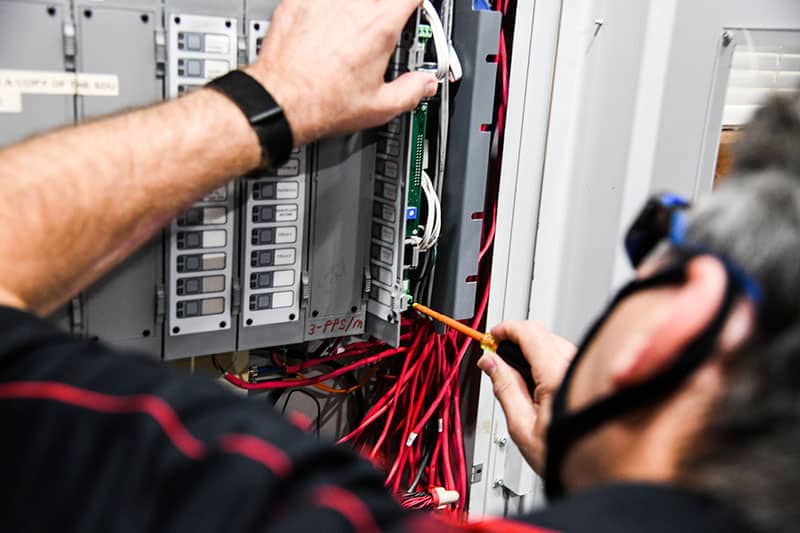
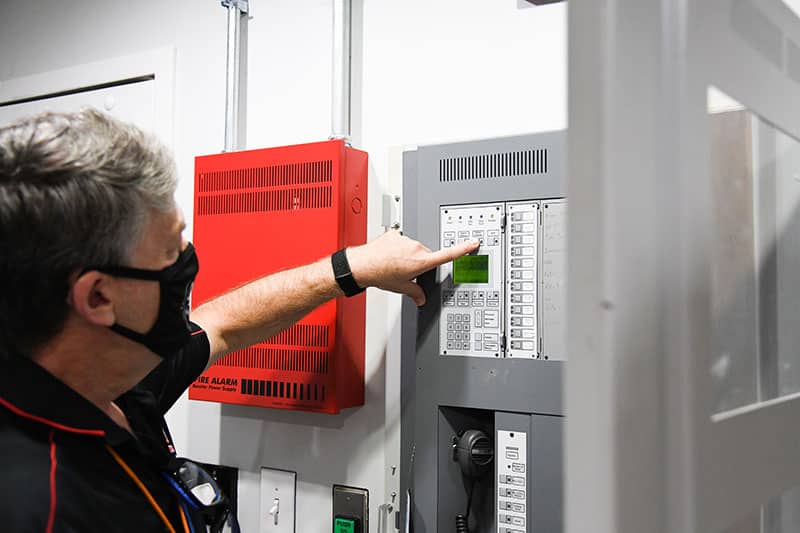
Mass Communication
A mass communication system is vital for restaurants and hotels to ensure the safety and comfort of their guests and staff. It streamlines operations, enhances the customer experience, and plays a critical role in crisis management. By enabling effective communication in both routine and emergency situations, such systems help create a safe, efficient, and responsive environment, contributing to both operational success and a positive guest experience.
Emergency Communication and Safety
- Alerting Guests and Staff in Emergencies: In case of an emergency—such as a fire, natural disaster, medical emergency, or security threat—a mass communication system allows management to quickly disseminate important information to all guests and staff simultaneously. This ensures that everyone is aware of the situation and knows what actions to take (evacuation, shelter in place, etc.).
- Coordinating Evacuations: During an emergency, clear, quick communication can save lives. A mass communication system can send real-time notifications (via alarms, voice messages, text alerts, etc.) to guide people to safe exits or assembly areas, reducing confusion and panic.
- Ensuring Compliance with Safety Protocols: Many fire and safety codes require establishments like hotels and restaurants to have a way to notify everyone on the premises in case of an emergency. A mass communication system helps ensure compliance with these regulations, improving overall safety.
Operational Efficiency
- Coordinating Staff in Real-Time: A mass communication system helps staff communicate quickly and efficiently across large properties (restaurants, hotels, resorts, etc.). Managers can broadcast messages to different departments, such as housekeeping, kitchen, and front desk, ensuring smoother operations. For instance, if there’s a sudden rush at the bar or in the dining area, staff can be alerted to assist.
- Managing Staff Alerts: It can also be used to quickly communicate urgent messages or changes in schedules (e.g., shift changes, equipment breakdowns, or supply shortages), ensuring that everyone is on the same page.
- Boosting Productivity: With instant communication, staff can respond more effectively to guests’ needs, reducing delays and creating a more organized and streamlined service environment.
Enhancing Security and Preventing Threats
- Coordinating with Security: In the event of a security threat, whether it’s a medical emergency, suspicious activity, or an intruder, a mass communication system allows staff to alert security personnel, as well as other departments, in real-time to take immediate action.
- Controlling Access: In some cases, mass communication systems can be integrated with access control systems to alert guests and staff of restricted areas or to provide updated information about access restrictions (e.g., temporary closure of certain areas for maintenance or security reasons).
Enhancing Brand Image and Customer Trust
- Building Trust: When a mass communication system is used effectively, guests feel safe and cared for, knowing that the hotel or restaurant has a plan in place for emergencies, and can communicate clearly and efficiently. This enhances the reputation of the business and builds customer loyalty.
- Creating a Positive Environment: The ability to communicate important information and updates quickly helps guests feel more relaxed, as they are always in the loop, whether it’s about room changes, dining schedules, or special offers.
Improving Customer Experience
- Providing Information and Updates: A mass communication system can be used to enhance the guest experience by sharing important updates about services, events, or special promotions. For instance, a hotel could use the system to notify guests of restaurant hours, event schedules, or room service availability.
- Managing Service Flow: In a restaurant, a mass communication system can help manage large crowds by providing wait-time updates, notifying customers when their table is ready, or announcing special offers or menu items. This keeps guests informed and improves their overall experience.
- Enhancing Comfort and Convenience: In hotels, a communication system can relay housekeeping notifications, maintenance schedules, or check-out reminders, helping guests plan their day more efficiently. It can also assist with service requests (e.g., informing housekeeping or the front desk of a request or issue).
Marketing and Promotion
- Promoting Events and Offers: Mass communication systems can be used to broadcast information about in-house events, special offers, or seasonal promotions. In a hotel, this could include promotions for spa treatments, happy hour deals at the bar, or special dinner packages. In a restaurant, it could be used to highlight new menu items, loyalty program updates, or live music schedules.
- Targeted Messaging: Some systems allow for tailored messaging, so specific groups (like VIP guests or conference attendees) can receive customized offers or information relevant to their experience.
Facilitating Routine Announcements
- Managing Day-to-Day Communication: For daily operations, a mass communication system can help with non-urgent announcements such as announcing opening hours, offering menu updates, or advising guests on local attractions or amenities. This helps improve the guest experience by keeping everyone informed.
- Smoothing Operations: In large-scale operations, such as hotels with multiple restaurants, conference rooms, or other facilities, the system ensures seamless communication across departments. It can be used for routine updates like maintenance schedules, new service hours, or updates on room availability.
Operational Continuity During Disruptions
- Managing Power Outages or Other Service Interruptions: In the event of power outages, technological glitches, or service disruptions (e.g., plumbing issues, Wi-Fi outages), a mass communication system can help notify guests and staff promptly. This allows for better handling of situations that might otherwise lead to frustration or confusion.
- Maintaining Customer Confidence: By keeping guests informed during times of disruption, a hotel or restaurant shows professionalism and care, potentially preventing negative reviews or dissatisfaction.
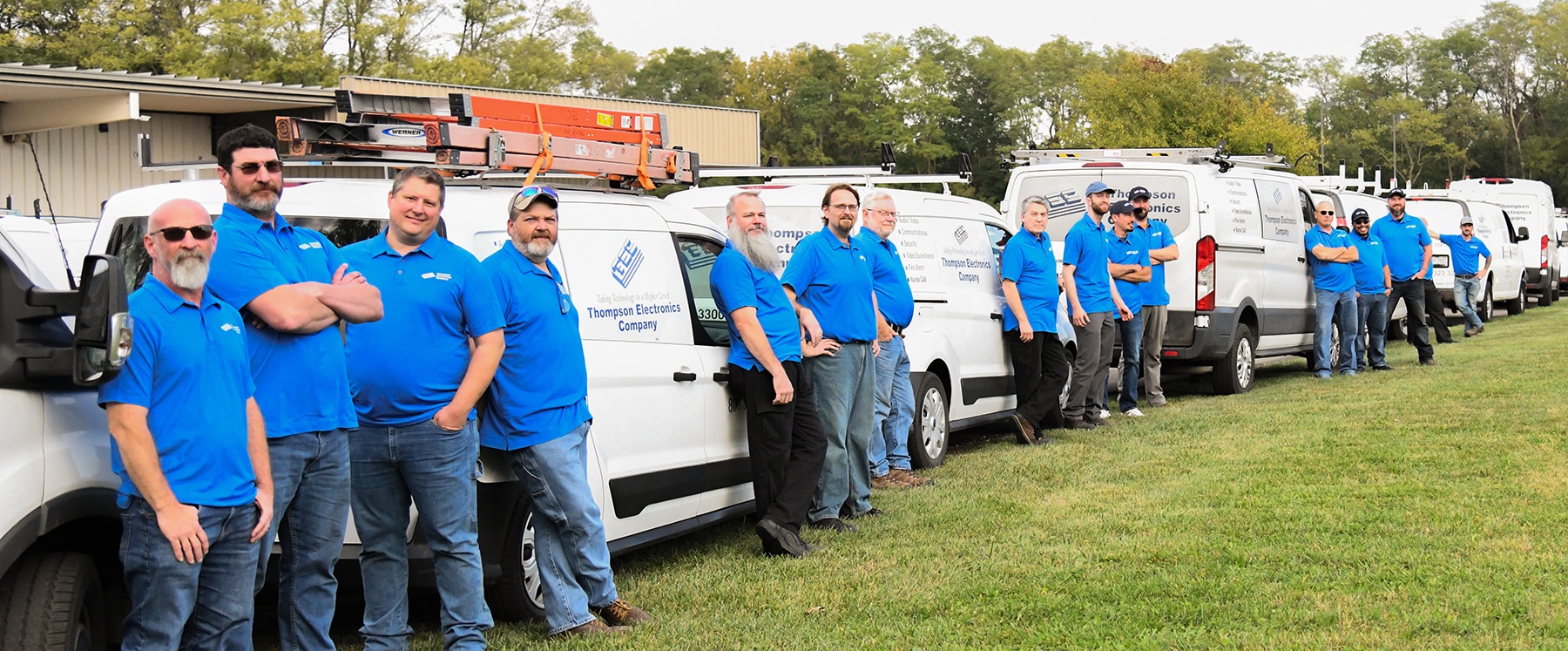
You’re Backed By Experts
Our technicians are fully insured, bonded, and registered with the State of Illinois Department of Professional Regulation. Each one of our techs goes through extensive training and has years of on-the-job experience. You can trust the Thompson Team.
Real Customer Reviews
“Thompson Electronics was recommended to us by our contractor. We have enjoyed working with TEC and the new fire system is reliable and makes us feel very safe.”
“Thompson Electronics installed our new fire alarm monitoring system in a timely manner to ensure the project to rehabilitate our new street maintenance facility remained on schedule. Following the installation, the Thompson Electronics staff have been helpful and responded quickly to questions about the new system.”
“It has been a pleasure working with TEC technician, Alan. He is knowledgeable and easy to work with. Our lives have been made easier for troubleshooting and campus wide issues.”

